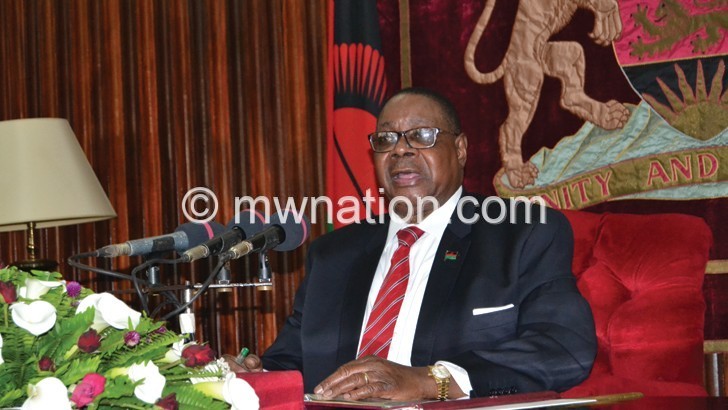APM asks Malawians not to panic
President Peter Mutharika has asked Malawians not to panic over maize harvest, saying the country has about 234 000 metric tonnes (MT) of maize stock in grain reserves, enough to feed the nation.
The President’s sentiments come at a time when there are fears that the country may face food shortage in the current farming season due to combined effects of dry spells and fall armyworms attacks on maize crop.

According to statistics provided by the Ministry of Agriculture, Irrigation and Water Development last week, dry spells and fall army worms have so far affected an estimated 580 000 hectares (ha) of maize.
Roughly, the country harvests around 3.4 million MT of maize with an annual requirement of 3.2 million MT of maize.
But speaking yesterday at a political rally in Nchalo, Chikwawa, Mutharika said there is no need to panic as the available stock would cushion the country while other interventions are also being thought of.
He said: “The issue of hunger is a very serious one as Paramount Chief Lundu has said. Last year, I was being forced to lift the maize export ban I had put in place, but it seems it has helped the country as there is stock that will help us.”
Mutharika also pleaded with Malawians not to sell their maize considering the crop situation facing the country.
Last December, President Mutharika declared 20 districts that were affected by fall armyworms, which has affected about 270 000 hectares, as disaster areas.
Commenting on the issue, agricultural expert Tamani Nkhono-Mvula said Mutharika’s assurance was conditional on the pattern of the rains.
He said the President may have been looking at the current gap in terms of the expected production and what is in the strategic reserves.
“If the rains start falling well now, I don’t think the country will have a dire food crisis because if you look at the hectarage so far attacked as shown by the first-round crop estimate, that can indeed be covered by what we have in the strategic reserves.
“But if the rains continue misbehaving then there may be cause for concern because I don’t think what is in reserve is going to feed the nation and we may need to supplement that with something like imports,” said Nkhono-Mvula, a former national director of the Civil Society on Agriculture Network (CisaNet).
In the 2016/17 farming season, maize production jumped by about 35.9 percent to 3.2 million MT compared to 2.3 million MT in the 2015/16 season when the country faced serious food shortage.
In his speech during the Nchalo rally, Chikwawa Central Member of Parliament Zaheer Gaffar Issa appealed to Mutharika to help the area as it is one of the hardest hit by effects of dry spells and fall armyworms. n





